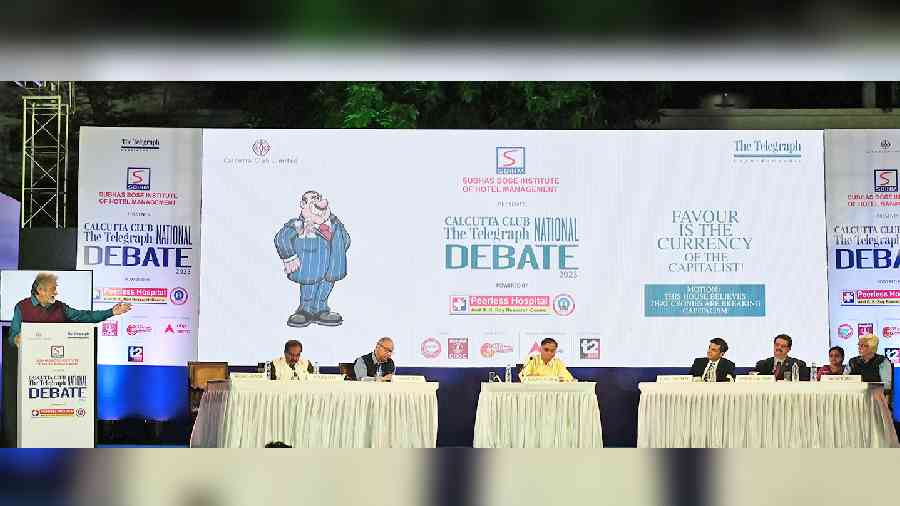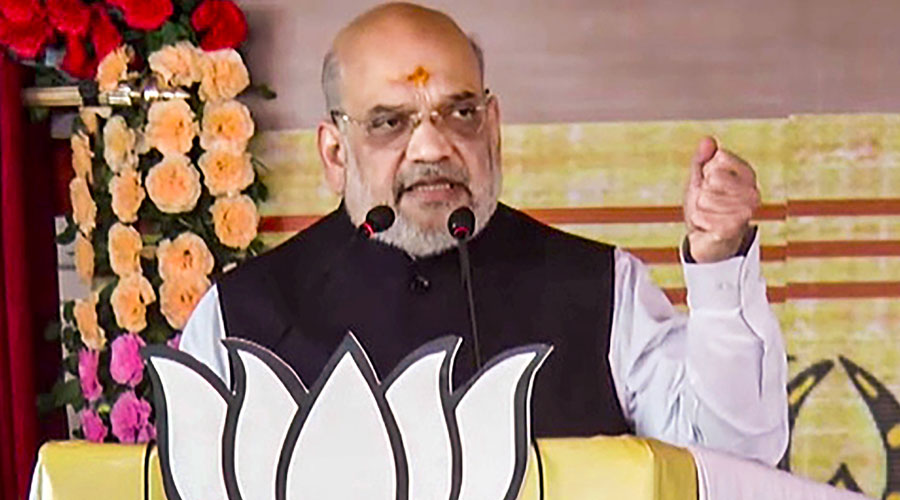All capitalists are alike; all cronies are capitalists after their own fashion.
Some at The Telegraph-Calcutta Club National Debate on Saturday evening held them to be essential to capitalism, others only occasionally relevant, even disruptive.
Koushik Chatterjee of Tata Steel likened them to cockroaches who need to be fed a dose of pesticides. Sanjaya Baru, author-commentator and media adviser to then Prime Minister Manmohan Singh, argued that the plinth of capitalism was built on cronyism.
“I want to tell the city of Calcutta that Ghanshyam Das Birla was India’s first crony capitalist. He opposed the Tatas’ support to the Swarajya Party and declared the Congress to be the party of capitalism. The Birlas benefited from the industrial licensing policy, they were issuing cheques to the Congress in return for policy changes as far back as 1938, that is how old cronyism is in India’s capitalism.”
It says something of the two-toned nature of Saturday night’s motion that both Koushik Chatterjee and Sanjaya Baru sat on the same side of the floor.
They were saying radically different things yet together opposing the motion, which went: This house believes that cronies are breaking capitalism. It also said something of the inbuilt paradox of the motion that when it was put to vote, the house responded with a tied verdict.
Capitalism and cronyism never really got clearly sorted or separated, and perhaps rightly, in the discourse of any speaker.
What was unambiguous, though, was that the identity of the unnamed elephant on whose back the debate rode was apparent to all: Gautam Adani, old and close friend of Prime Minister Narendra Modi and troubled target of the Hindenburg report.
If there existed any lack of clarity over who was at the centre of the evening’s argument, it was taken care of by the human frame that looked behind the arc-lit stage: a crisp caricature that mimicked the controversial Gujarati businessman to the T.
For all his endorsement of cronyism as the backbone of capitalism, even Baru conceded discomfort with the way things had come to be. “Why are we worried about crony capitalism today? It is because we no longer know whether M is going to A or whether Ais going to M.” In effect, we know there is an elephant and inevitably there is a mahout, we aren’t always clear which is which.
Former bureaucrat and Trinamul MP Jawhar Sircar, who opened the debate, articulated the cause for alarm bluntly: “The interests of cronies are much bigger to the ruler than anything, the ruler draws sustenance from them, and this has led to a collusion between the forces against democracy and those who would like to keep it that way.... We are heading to an autocracy from which there seems no escape.”
Development economist Abhirup Sarkar spoke like a development economist and went back to the Industrial Revolution to describe the nature of capitalism and labour.
“Capitalism raised standards of living but it could not lift everyone at the same rate, and one of the reasons was that cronyism restricted competition and capitalism itself got thwarted in the process.”
Rudra Chatterjee, frontline tea and carpet entrepreneur, sought to smother the pronouncements of peril from the other side, not by defending cronyism but by arguing that capitalism was well capable of surviving what dangers it may cause.
Quoting the wisdoms of The Economist and the World Economic Forum, Chatterjee submitted that there was “really no co-relation” between capitalism and cronyism.
“Singapore ranks just behind Russia in the indices, and so yes, cronyism is bad but capitalism survives,” he held.
He also quoted the names of a whole range of Indian business houses and said their success had come from not cronyism but sound corporate and professional practices.“The natural habitat of cronyism is the mai-baap licence raj; the sunlight of capitalism kills cronyism…. There will be cronyism in capitalism as long as there are crooks in society.”
Ouch! Mr Caricature, that would have hurt. Coming into the debate at the very end from the other end, economist and academic Prabhat Patnaik sort of agreed with the coexistence of capitalism and cronyism. In a brutal sort of way.
“All capitalism,” the Marxism scholar said, “is crony capitalism but in some way the violation of the rules of capitalism is also cronyism.
Rahul Bajaj said at a meeting of industrialists in the presence of Amit Shah that everyone was afraid, he meant something.
Cronyism is only possible in an atmosphere of fascism or neo-fascism, and cronyism is not easy to get rid of. It is a cancer and it arises in close proximity to fascism.”
Mr Caricature looked down the lawns of the Calcutta Club from his vinyl throne backstage. The house, well, it resolved that this debate is yet unresolved.











